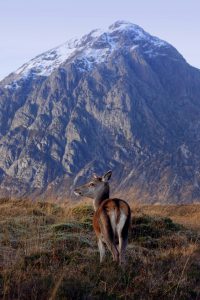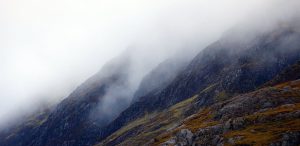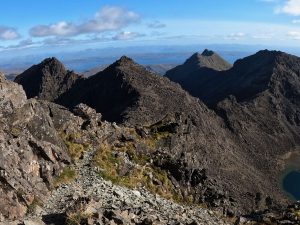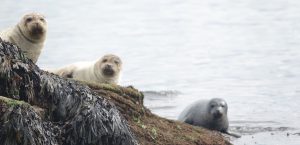| Anglican lectionary: Catholic lectionary: |
1st Reading Isa 40:1-11 both |
Psalm 85 :1-2,8-13 – |
2nd Reading 2 Pet 3:8-15a both |
Gospel Mark 1:1-8 both |
by Rev. David Coleman, Environmental Chaplain, EcoCongregation Scotland
(all pictures by David Coleman)
SECTION ONE: NOTES ON THE READINGS
Isaiah 40:1-11

The prophet conveys the (re-)constructive intent of God, though dependent upon recognition by people that the suffering now experienced is directly related to the choices they made; the damage they have been responsible for. ‘Jerusalem’ is not limited to humans, but includes land, landscape, and associated wildlife as I encounter it here in Scotland. The mountains, the carbon-guzzling wetlands, the deer, the huge grey seals, the endangered wildcats. All flesh, (not just all people) is offered this vision.
I’m wary, therefore, of a ‘bulldozer’ approach to the “wilderness”, which is the realm, full of life, though least shaped by human intent. It’s less about open-cast mining and dynamiting the hills for a ten-lane freeway, than the vision of ensuring inclusive justice, because God’s glory can otherwise never be glimpsed anyway. What are the obstacles to that vision? A brutal desecration of the soul of the land in ways familiar to industrial cultures will raise, rather than remove such obstacles. The role of grass, too, is ambivalent. Our mortality and fragility give the lie to the idolatrous false consciousness behind fantasies of unlimited growth and single-use industrial processes. We are ‘like grass’, and we can’t pretend otherwise. Only God’s Creative Power /Word ‘stands for ever‘. Grass has its day, perhaps feeding animals, before a time of renewal; grass in green patches and wildflower-meadows, keeping city-dwellers sane. Finally, there is the robust guidance and care of a shepherd, rather than a dictator. Any truly royal road, we may pray, will embrace and respect the grass-covered contours of the hills, rather than blast them aside.
Psalm 85 :1-2, 8-13

God is gracious to the land/soil, which includes the people addressed as ‘Jacob/Israel’.
Forgiveness sets people free to deal with the consequences of former crimes. Such opportunities are not lightly given. Note the relatedness – and perhaps the shared identity – of justice, peace, and the Glory of God. They’re in love with each other! The literal rootedness of truth in the Earth, in a dance of hope with justice in the skies, from which come the blessings of sunshine and rain escape the confines of mere metaphor, though English speakers may have to remind themselves that ‘heaven’ is not another dimension, but integral to God’s whole Creation, as well as identical with the sky we daily look up to. The poetry here is essentially many-layered: there are no “only’s”. There is no such thing in this Psalm as ‘mere metaphor’: the experiential rootedness of the whole in our partnership and dependency on the Earth is underlined too by the praise of peace, for Creation is the first casualty in human conflict. And “salvation is very near to those who fear him” where fear is not disabling terror, but the acknowledgement of warnings given in love, be they by the human voice of prophets or the prophetic Voice of the Earth.
2 Peter 3:8-15a
We’re all too ready, having learned to look up to God-who-is-great, to mistake the mere appearance of greatness for divinity. We have no problem that for God ‘a thousand years are like one day’ but skip over that “one day is like a thousand years”, which explosively opens up the responsibilities, dangers and opportunities of every breath we take. Holy impatience, and the determination never to mistake procrastination for wisdom follow from this insight. This passage is part of the huge body of New Testament writings which promote maximum vigilance, engagement and awareness as an appropriate way of life for God’s faithful people, all the more, for those conscious of the “turning of the ages”. With the repeated reminder that the Day of the Lord defies all calculation and preparation, this becomes a spiritual resource for every age of threat and oppression. We do not expect a sudden resolution of the multi-layered environmental crises of our day; we therefore look to build spiritual resilience even as we encounter the effects of what humanity has unleashed upon the planet.
Doing the right thing, irrespective of whether or not we ‘fix the world’ therefore has the value and dignity of prayer.
GOSPEL Mark 1:1-8

The radically ‘new thing’ of the beginning of Good News is nonetheless an instance of divine recycling: in this case, of the prophecy of Isaiah. We are encouraged, therefore, that by the power of the Spirit, scriptures which ring bells of meaning and recognition in our lives will be all the more applicable to our spiritual and environmental contexts. John claims as his pulpit the life-filled ecosystems (wilderness) outside the control of humanity offering an “immersion” in “change-of-mind” for the healing of the damage done by such harmful choices as we freely acknowledge. Jesus will soon after (Mark 1:12) seek out the fellowship of the wildlife and the nurture of the angels (God’s messengers) in this same environment. The wilderness will be the teacher of Christ, and the mentor for his mission. The whole message is totally concrete and contemporary: John’s location, dress, low-impact diet and the recognition that whatever his own contribution, it would not be sufficient to ‘fix’ the world. We also note the wholesale acceptance of everyone who makes the effort to change. Complicity in the violation of Creation is no excuse for involvement in Creation’s protection, nurture and healing.
SECTION TWO: DRAFT SERMON/SERMON OUTLINE
(Isaiah and Mark)

This is good news: that it is not our perfection, independence, or strength, which enable justice, peace, and the health of the planet. As people gather next November for the COP in Glasgow, God’s work will be far wider than the crucible of the conference hall. Churches will be learning, welcoming, and being liberated from the duty to keep things ‘as they always have been’. To build the inclusive road, we have to break new spiritual ground.
It is rather our limitations and our readiness to confess what we have got wrong – and to seek partnership in healing the resultant harm – that unlocks the best possible outcome following this inevitably declining Age we live in. (This Age of fossil fuels, the age of the dominant lie of endless growth, the age of mountainous and impregnable arguments that in money alone lies salvation.) This Age that is passing away. It is foolish and dangerous to deny it.
It is therefore to the levelling of this gross landscape of exploitative and unjust obstacles that recycled prophetic power shall be applied.
The fragile beauty of Earth’s hills and valleys, each a statement of glory amidst the diverse life of our planet’s ‘wilderness’ ecosystems, can be revered and respected as witness to the healing that must follow.
The landscape through which John drives his bulldozer is the most un-co-operative of all: the landscape of our entrenched attitudes; and certainty – pre-shaken by the ‘gift’ of the pandemic – that salvation resides in shoring up an unsustainable way of life, at cost of all other ‘flesh’ over and above the human.
It’s a sad, despairing, narrow-minded outlook, refusing to write off what cannot be preserved.
The Wilderness itself is co-prophet in John’s fulfilment action: incarnating the Word in the most literally immersively experiential and earthy / earthly way.
Global threat and healing are necessarily inclusive. None is excluded from John’s offer of total immersion in change of mind, that sets the sinner free to live better, and sets God free from vengeance.
By the promised Baptism of Spirit / Breath / Wind, (which, after all, powers the turbines) we find our place and purpose in an urgent and transformative project.
Though forgiveness may be forthcoming, responsibility, and consequences remain. To be paralysed by guilt is to be defeated by sin. To be overwhelmed by the task is to disregard the power and solidarity of God in Christ Jesus. Be happy! Do not worry about tomorrow, but get on with today!
John himself errs in the insignificance of his own contribution. Jesus is later to describe him as the greatest human yet born. Yet John’s exemplary humility empowers us. The smallness of whatever lies within our hands is no cause to neglect it, be this speaking out to others, transforming with justice our own diet, or lifestyle to reduce our impact on planet and the suffering of fellow humans.

We pray therefore for a revelation of the implications of our Baptism, both individually, as with the Communion of Saints, and as part of the Communion of Creation, stakeholders to God’s Rainbow Covenant, recycled and renewed in Christ.
At folk gather in Glasgow next year, we hope to ring bells: not just a call to worship, but an ancient Celtic practice, to drive out evil spirits and call injustice to account before God.
SECTION THREE: ADDITIONAL MATERIAL
Video Advent Calendar: starts 29th November at www.facebook.com/ecorevscot
A location reading of 2 Peter 3:8-15a on the Pentland Hills in Scotland:
The Lord’s Prayer on the summit of a Scottish Mountain:
One day I said sorry out loud to the Earth (confession and liberation of forgiveness).
(a hymn set to a traditional British tune) (words in the YouTube notes):
by Rev David Coleman, Scotland
 Erasmus+ – project
Erasmus+ – project